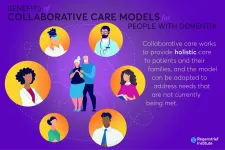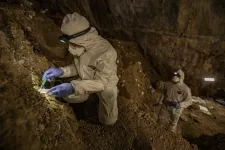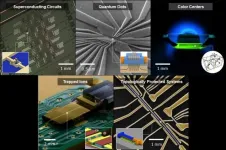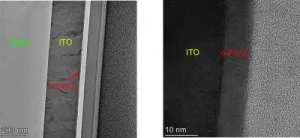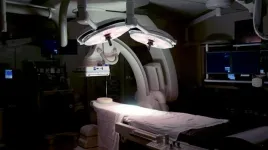INFORMATION:
WCS (Wildlife Conservation Society)
MISSION: WCS saves wildlife and wild places worldwide through science, conservation action, education, and inspiring people to value nature. To achieve our mission, WCS, based at the Bronx Zoo, harnesses the power of its Global Conservation Program in nearly 60 nations and in all the world's oceans and its five wildlife parks in New York City, visited by 4 million people annually. WCS combines its expertise in the field, zoos, and aquarium to achieve its conservation mission. Visit: newsroom.wcs.org Follow: @WCSNewsroom. For more information: 347-840-1242.
Who is selling and trafficking Africa's wild meat?
Study looks at different types of traffickers and sellers in cities
2021-04-19
(Press-News.org) BRAZZAVILLE, Republic of Congo (April 19, 2021) - A new study classifies different types of wildlife traffickers and sellers in two of Central Africa's growing urban centers, providing new insight into the poorly understood urban illegal wildlife trade. The findings can help conservation and law enforcement authorities prioritize their efforts on professional criminals, identify patterns among repeat offenders, and determine if wildlife offenders are engaging in other types of crime.
Authors from the University of Maryland and Wildlife Conservation Society (WCS) describe their findings in the journal Global Ecology and Conservation. The research focused on a range of species, including great apes, pangolins, and crocodiles and helps to clarify where professional criminals potentially engage with illegal supply chains, where the illegal value chains share touchpoints with other forms of criminality, and where they do not.
The authors created a classification of urban wild meat trafficking and selling in Brazzaville and Pointe Noire, Republic of Congo. They found that the types of wildlife traffickers and sellers were different in terms of their professionalism, offending rates, criminality, and need for resources that support continued criminality. The results help show the variation of wild meat trafficking in Republic of Congo's urban centers which can help focus conservation programs so they are more precise and are more likely to achieve intended outcomes.
For example, one category called "Criminal diversifiers" use traditional economic models of supply and demand for pangolin scales and often have connections with border officials; they can be multi-lingual (e.g., Lingala, Munukutuba, Swahili, French, English). The transnational nature of pangolin scale trafficking requires border contacts and professional sellers manage the logistics of the illicit supply chain, moving large quantities of scales across oceans and continents. Based on participant perceptions, this is the most high-level criminal connection of all species.
Urban wild meat consumption can contribute to significant declines in wildlife populations, ecosystem function, and food insecurity. Classifying groups and individuals involved in urban wild meat trafficking may help distinguish ordinary citizens from members of criminal organizations, and help reduce stereotyping and injustice, the authors note. Characterizing stakeholders is also useful for focusing the format, content and distribution methods of communication, marketing, or education campaigns designed to reduce wildlife trafficking.
Said the study's lead author Dr. Meredith Gore of the University of Maryland: "This research helps amplify the voices of diverse local experts with extensive knowledge about the human dimensions of the illegal wildlife trade in and to African cities. The new information about forms of sellers and traffickers may help identify where the criminological risks from illegal wild meat trade are concentrated, and where they are not, along the bridge from rural to urban environments."
Said the study's co-author Christian Plowman of WCS's Central Africa Program: "It will be exciting to see these crime science-based approaches tested (and retested) in other urban environments and for other species of conservation concern. Cross-disciplinary and evidence-based approaches to preventing conservation crime can add value to existing efforts."
Hunting and fishing contribute to rural diets, and in low-density and non-commercial settings, do not normally pose a threat to wildlife populations. The loss of pangolins, apes and crocodiles due to illegal overharvesting for wild meat would result in loss of tourism revenue, have a destabilizing effect on forest and freshwater ecosystems, and impact rural communities who still rely on their natural resource base for livelihoods, culture and food security.
The authors say that further refining the lists and definitions of, as well as linkages between, types of sellers and traffickers of illegal urban wild meat will be useful, as urbanization continues at a rapid pace in the Republic of the Congo, and elsewhere in the world. As the size and wealth of the urban populations grows, the demand for wild meat is expected to increase.
Minimizing adverse per capita impacts of cities on natural resources and the living environment and supporting more positive environmental links between urban and rural areas, can be accomplished in part through reduced wild meat trafficking. Reducing the scope and scale of criminality associated with wild meat trafficking can enable better realization of sustainable development goals, such as tourism revenue from protected areas and rural communities relying on natural resource bases for livelihoods, cultural heritage, and food security.
ELSE PRESS RELEASES FROM THIS DATE:
National report highlights benefit of collaborative care models for people with dementia
2021-04-19
INDIANAPOLIS -- A new report from the National Academies of Sciences, Engineering, and Medicine (National Academies) details the state of dementia care and research in America and provides guidance on future research to make sure both patients and their families are having their needs met by the care they receive. Sections of the report highlight the effectiveness of the collaborative care model as well as successful implementation, citing research from Regenstrief Institute, Eskenazi Health and the Indiana University School of Medicine.
There are between 3.7 million and 5.8 million people living with dementia ...
Stone Age black bears didn't just defecate in the woods - they did it in a cave too
2021-04-19
Scientists have sequenced ancient DNA from soil for the first time and the advance will transform what is known about everything from evolution to climate change.
The findings have been described as the 'moon landings' of genomics because researchers will no longer have to rely on finding and testing fossils to determine genetic ancestry, links and discoveries - and it is thanks to Stone Age black bears who defecated in a remote cave in Mexico 16,000 years ago.
A team of scientists from The Lundbeck Foundation GeoGenetics Centre, University of Copenhagen, led by Professor Eske Willerslev, director of the foundation and a Fellow of St John's College, University of Cambridge, recreated ...
Sleep disorders and surgery: Anesthesia & Analgesia marks first decade of the Society of Anesthesia and Sleep Medicine
2021-04-19
April 19, 2021 - An estimated 50 million people undergo surgery each year in the United States, and a significant proportion of them have undiagnosed or untreated sleep disorders (SD) or sleep-disordered breathing (SDB). Issues at the intersection of anesthesiology and sleep medicine are the focus of the Society of Anesthesia and Sleep Medicine (SASM) whose 10th anniversary is commemorated in the special theme May issue of Anesthesia & Analgesia.
The special issue looks back at a remarkable first decade of achievements in research and clinical practice by this young subspecialty society, while looking forward to further progress. A key ...
Two blood thinners at once: More risk with the same reward
2021-04-19
More blood thinners aren't automatically better, another study confirms.
A new publication in JAMA Internal Medicine focuses on the minimal pros and the concerning cons of combining a daily aspirin with a drug from the newer class of anticoagulants that include apixaban, dabigatran, edoxaban and rivaroxaban.
Patients were taking one of these direct oral anticoagulants known as DOACs to prevent strokes from non-valvular atrial fibrillation or for the treatment of venous thromboembolic disease (deep vein thrombosis or pulmonary embolism). The included patients did not have another reason to take aspirin ...
Gene therapy shows promise in initial trial for patients with childhood blindness
2021-04-19
PHILADELPHIA - A new gene therapy for one of the most common forms of congenital blindness was safe and improved patients' vision, according to initial data from a clinical trial led by researchers at the Scheie Eye Institute in the Perelman School of Medicine at the University of Pennsylvania.
The therapy delivers working copies of GUCY2D to the eyes of patients who have severe vision impairments caused by mutations in the gene. Each of the first three treated patients experienced improvement in some aspects of vision, without serious side effects, according to the new study, published in the journal iScience.
"We found sustained improvements in both day and night vision, even with a relatively low dose of the gene therapy," said study lead author Samuel G. Jacobson, MD, ...
Materials advances are key to development of quantum hardware
2021-04-19
A new study outlines the need for materials advances in the hardware that goes into making quantum computers if these futuristic devices are to surpass the abilities of the computers we use today.
The study, published in the journal Science by an international team, surveyed the state of research on quantum computing hardware with the goal of illustrating the challenges and opportunities facing scientists and engineers.
While conventional computers encode "bits" of information as ones and zeroes, quantum computers breeze past this binary arrangement by creating "qubits," which can be complex, continuous quantities. Storing and manipulating information ...
Mayo researchers, collaborators identify 'instigator' gene associated with Alzheimer's disease
2021-04-19
JACKSONVILLE, Fla. -- In a new paper published in Nature Communications, Mayo Clinic researchers and collaborators report the protein-coding gene SERPINA5 may worsen tau protein tangles, which are characteristic of Alzheimer's disease, and advance disease. By combining clinical expertise, brain tissue samples, pathology expertise and artificial intelligence, the team clarified and validated the relevance of the gene to Alzheimer's disease.
The researchers used tissue samples from 385 brains donated to the Mayo Clinic Brain Bank, which houses more than 9,000 brain tissue specimens for the study of neurodegenerative disorders. The samples were from people who were diagnosed with Alzheimer's disease and lacked co-existing diseases found in ...
Green hydrogen: "Rust" as a photoanode and its limits
2021-04-19
Hydrogen will be needed in large quantities as an energy carrier and raw material in the energy system of the future. To achieve this, however, hydrogen must be produced in a climate-neutral way, for example through so-called photoelectrolysis, by using sunlight to split water into hydrogen and oxygen. As photoelectrodes, semiconducting materials are needed that convert sunlight into electricity and remain stable in water. Metal oxides are among the best candidates for stable and inexpensive photoelectrodes. Some of these metal oxides also have catalytically active surfaces that accelerate the formation of hydrogen at the cathode or oxygen at the anode.
Why is rust not much better?
Research has long focused on haematite (α-Fe2O3), ...
Microglia, Stockholm syndrome and miraculous cures in glioblastoma patients
2021-04-19
MINNEAPOLIS - April 19, 2021 - Despite access to some of the best possible medical care in the world, Senators John McCain and Edward Kennedy both died within 18 months of their diagnosis of glioblastoma, an aggressive form of brain cancer. While this deadly outcome typifies the nature of this disease, some glioblastoma patients see exceptional benefits from chemotherapy and survive beyond expectations. Why this happens has been revealed by researchers at the University of Minnesota in a new study published in the Proceedings of the National Academy of Sciences.
"Deciphering the molecular underpinning of these exceptional ...
Delaying cardiovascular surgeries due to COVID-19 has psychological effects on patients
2021-04-19
In March 2020, when the pandemic hit, everything slowed, including non-essential medical procedures such as elective surgeries, to reduce the spread of the coronavirus.
Six weeks later, Mary Byrnes, Ph.D., an assistant research scientist in the Department of Surgery at Michigan Medicine, began calling University of Michigan Frankel Cardiovascular Center patients whose surgeries had been canceled or delayed. She wanted to hear about their experiences -- what undergoing surgery meant to them, how postponing their operations had affected them, whether the existence of the coronavirus complicated how they felt about their bodies and ...
LAST 30 PRESS RELEASES:
Molecular glue discovery: large scale instead of lucky strike
Insulin resistance predictor highlights cancer connection
Explaining next-generation solar cells
Slippery ions create a smoother path to blue energy
Magnetic resonance imaging opens the door to better treatments for underdiagnosed atypical Parkinsonisms
National poll finds gaps in community preparedness for teen cardiac emergencies
One strategy to block both drug-resistant bacteria and influenza: new broad-spectrum infection prevention approach validated
Survey: 3 in 4 skip physical therapy homework, stunting progress
College students who spend hours on social media are more likely to be lonely – national US study
Evidence behind intermittent fasting for weight loss fails to match hype
How AI tools like DeepSeek are transforming emotional and mental health care of Chinese youth
Study finds link between sugary drinks and anxiety in young people
Scientists show how to predict world’s deadly scorpion hotspots
ASU researchers to lead AAAS panel on water insecurity in the United States
ASU professor Anne Stone to present at AAAS Conference in Phoenix on ancient origins of modern disease
Proposals for exploring viruses and skin as the next experimental quantum frontiers share US$30,000 science award
ASU researchers showcase scalable tech solutions for older adults living alone with cognitive decline at AAAS 2026
Scientists identify smooth regional trends in fruit fly survival strategies
Antipathy toward snakes? Your parents likely talked you into that at an early age
Sylvester Cancer Tip Sheet for Feb. 2026
Online exposure to medical misinformation concentrated among older adults
Telehealth improves access to genetic services for adult survivors of childhood cancers
Outdated mortality benchmarks risk missing early signs of famine and delay recognizing mass starvation
Newly discovered bacterium converts carbon dioxide into chemicals using electricity
Flipping and reversing mini-proteins could improve disease treatment
Scientists reveal major hidden source of atmospheric nitrogen pollution in fragile lake basin
Biochar emerges as a powerful tool for soil carbon neutrality and climate mitigation
Tiny cell messengers show big promise for safer protein and gene delivery
AMS releases statement regarding the decision to rescind EPA’s 2009 Endangerment Finding
Parents’ alcohol and drug use influences their children’s consumption, research shows
[Press-News.org] Who is selling and trafficking Africa's wild meat?Study looks at different types of traffickers and sellers in cities

